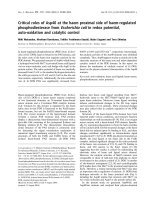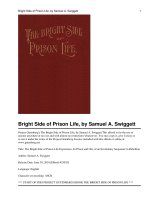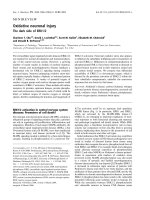This side of paradise
Bạn đang xem bản rút gọn của tài liệu. Xem và tải ngay bản đầy đủ của tài liệu tại đây (1.11 MB, 234 trang )
TheProjectGutenbergEBookofThisSideofParadise,byF.ScottFitzgerald
ThiseBookisfortheuseofanyoneanywhereatnocostandwith
almostnorestrictionswhatsoever.Youmaycopyit,giveitawayor
re-useitunderthetermsoftheProjectGutenbergLicenseincluded
withthiseBookoronlineatwww.gutenberg.org
Title:ThisSideofParadise
Author:F.ScottFitzgerald
ReleaseDate:August6,2008[EBook#805]
LastUpdated:February15,2018
Language:English
***STARTOFTHISPROJECTGUTENBERGEBOOKTHISSIDEOFPARADISE***
ProducedbyDavidReed,KenReeder,andDavidWidger
THISSIDEOFPARADISE
ByF.ScottFitzgerald
...WellthissideofParadise!...
There’slittlecomfortinthewise.
—RupertBrooke.
Experienceisthenamesomanypeople
givetotheirmistakes.
—OscarWilde.
ToSIGOURNEYFAY
CONTENTS
BOOKONE—TheRomanticEgotist
CHAPTER1.Amory,SonofBeatrice
CHAPTER2.SpiresandGargoyles
CHAPTER3.TheEgotistConsiders
CHAPTER4.NarcissusOffDuty
INTERLUDE
BOOKTWO—TheEducationofaPersonage
CHAPTER1.TheDebutante
CHAPTER2.ExperimentsinConvalescence
CHAPTER3.YoungIrony
CHAPTER4.TheSuperciliousSacrifice
CHAPTER5.TheEgotistBecomesaPersonage
BOOKONE—TheRomanticEgotist
CHAPTER1.Amory,SonofBeatrice
Amory Blaine inherited from his mother every trait, except the stray
inexpressible few, that made him worth while. His father, an ineffectual,
inarticulate man with a taste for Byron and a habit of drowsing over the
EncyclopediaBritannica,grewwealthyatthirtythroughthedeathoftwoelder
brothers, successful Chicago brokers, and in the first flush of feeling that the
world was his, went to Bar Harbor and met Beatrice O’Hara. In consequence,
StephenBlainehandeddowntoposterityhisheightofjustundersixfeetandhis
tendency to waver at crucial moments, these two abstractions appearing in his
sonAmory.Formanyyearshehoveredinthebackgroundofhisfamily’slife,an
unassertivefigurewithafacehalf-obliteratedbylifeless,silkyhair,continually
occupied in “taking care” of his wife, continually harassed by the idea that he
didn’tandcouldn’tunderstandher.
ButBeatriceBlaine!Therewasawoman!Earlypicturestakenonherfather’s
estateatLakeGeneva,Wisconsin,orinRomeattheSacredHeartConvent—an
educational extravagance that in her youth was only for the daughters of the
exceptionally wealthy—showed the exquisite delicacy of her features, the
consummateartandsimplicityofherclothes.Abrillianteducationshehad—her
youth passed in renaissance glory, she was versed in the latest gossip of the
OlderRomanFamilies;knownbynameasafabulouslywealthyAmericangirl
to Cardinal Vitori and Queen Margherita and more subtle celebrities that one
must have had some culture even to have heard of. She learned in England to
preferwhiskeyandsodatowine,andhersmalltalkwasbroadenedintwosenses
during a winter in Vienna. All in all Beatrice O’Hara absorbed the sort of
education that will be quite impossible ever again; a tutelage measured by the
numberofthingsandpeopleonecouldbecontemptuousofandcharmingabout;
a culture rich in all arts and traditions, barren of all ideas, in the last of those
days when the great gardener clipped the inferior roses to produce one perfect
bud.
In her lessimportantmomentsshereturnedtoAmerica,metStephenBlaine
andmarriedhim—thisalmostentirelybecauseshewasalittlebitweary,alittle
bitsad.Heronlychildwascarriedthroughatiresomeseasonandbroughtinto
theworldonaspringdayinninety-six.
WhenAmorywasfivehewasalreadyadelightfulcompanionforher.Hewas
anauburn-hairedboy,withgreat,handsomeeyeswhichhewouldgrowuptoin
time,afacileimaginativemindandatasteforfancydress.Fromhisfourthtohis
tenth year he did the country with his mother in her father’s private car, from
Coronado,wherehismotherbecamesoboredthatshehadanervousbreakdown
in a fashionable hotel, down to Mexico City, where she took a mild, almost
epidemicconsumption.Thistroublepleasedher,andlatershemadeuseofitas
anintrinsicpartofheratmosphere—especiallyafterseveralastoundingbracers.
So,whilemoreorlessfortunatelittlerichboysweredefyinggovernesseson
the beach at Newport, or being spanked or tutored or read to from “Do and
Dare,”or“FrankontheMississippi,”Amorywasbitingacquiescentbell-boysin
the Waldorf, outgrowing a natural repugnance to chamber music and
symphonies,andderivingahighlyspecializededucationfromhismother.
“Amory.”
“Yes,Beatrice.”(Suchaquaintnameforhismother;sheencouragedit.)
“Dear,don’tthinkofgettingoutofbedyet.I’vealwayssuspectedthatearly
rising in early life makes one nervous. Clothilde is having your breakfast
broughtup.”
“Allright.”
“Iamfeelingveryoldto-day,Amory,”shewouldsigh,herfaceararecameo
of pathos, her voice exquisitely modulated, her hands as facile as Bernhardt’s.
“My nerves are on edge—on edge. We must leave this terrifying place tomorrowandgosearchingforsunshine.”
Amory’s penetrating green eyes would look out through tangled hair at his
mother.Evenatthisagehehadnoillusionsabouther.
“Amory.”
“Oh,yes.”
“Iwantyoutotakeared-hotbathashotasyoucanbearit,andjustrelaxyour
nerves.Youcanreadinthetubifyouwish.”
Shefedhimsectionsofthe“FetesGalantes”beforehewasten;atelevenhe
couldtalkglibly,ifratherreminiscently,ofBrahmsandMozartandBeethoven.
One afternoon, when left alone in the hotel at Hot Springs, he sampled his
mother’s apricot cordial, and as the taste pleased him, he became quite tipsy.
This was fun for a while, but he essayed a cigarette in his exaltation, and
succumbed to a vulgar, plebeian reaction. Though this incident horrified
Beatrice, it also secretly amused her and became part of what in a later
generationwouldhavebeentermedher“line.”
“This son of mine,” he heard her tell a room full of awestruck, admiring
women one day, “is entirely sophisticated and quite charming—but delicate—
we’realldelicate;here,youknow.”Herhandwasradiantlyoutlinedagainsther
beautifulbosom;thensinkinghervoicetoawhisper,shetoldthemoftheapricot
cordial.Theyrejoiced,forshewasabraveraconteuse,butmanywerethekeys
turnedinsideboardlocksthatnightagainstthepossibledefectionoflittleBobby
orBarbara....
These domestic pilgrimages were invariably in state; two maids, the private
car,orMr.Blainewhenavailable,andveryoftenaphysician.WhenAmoryhad
the whooping-cough four disgusted specialists glared at each other hunched
aroundhisbed;whenhetookscarletfeverthenumberofattendants,including
physicians and nurses, totalled fourteen. However, blood being thicker than
broth,hewaspulledthrough.
TheBlaineswereattachedtonocity.TheyweretheBlainesofLakeGeneva;
they had quite enough relatives to serve in place of friends, and an enviable
standingfromPasadenatoCapeCod.ButBeatricegrewmoreandmoreproneto
likeonlynewacquaintances,astherewerecertainstories,suchasthehistoryof
herconstitutionanditsmanyamendments,memoriesofheryearsabroad,thatit
wasnecessaryforhertorepeatatregularintervals.LikeFreudiandreams,they
must be thrownoff,elsetheywouldsweepinand laysiege toher nerves.But
BeatricewascriticalaboutAmericanwomen,especiallythefloatingpopulation
ofex-Westerners.
“They have accents, my dear,” she told Amory, “not Southern accents or
Boston accents, not an accent attached to any locality, just an accent”—she
becamedreamy.“Theypickupold,moth-eatenLondonaccentsthataredownon
theirluckandhavetobeusedbysomeone.TheytalkasanEnglishbutlermight
after several years in a Chicago grand-opera company.” She became almost
incoherent—“Suppose—time in every Western woman’s life—she feels her
husbandisprosperousenoughforhertohave—accent—theytrytoimpressme,
mydear—”
Thoughshethoughtofherbodyasamassoffrailties,sheconsideredhersoul
quiteasill,andthereforeimportantinherlife.ShehadoncebeenaCatholic,but
discoveringthatpriestswereinfinitelymoreattentivewhenshewasinprocess
of losing or regaining faith in Mother Church, she maintained an enchantingly
wavering attitude. Often she deplored the bourgeois quality of the American
Catholicclergy,andwasquitesurethathadshelivedintheshadowofthegreat
Continentalcathedralshersoulwouldstillbeathinflameonthemightyaltarof
Rome.Still,nexttodoctors,priestswereherfavoritesport.
“Ah,BishopWiston,”shewoulddeclare,“Idonotwanttotalkofmyself.I
canimaginethestreamofhystericalwomenflutteringatyourdoors,beseeching
youtobesimpatico”—thenafteraninterludefilledbytheclergyman—“butmy
mood—is—oddlydissimilar.”
Only to bishops and above did she divulge her clerical romance. When she
hadfirstreturnedtohercountrytherehadbeenapagan,Swinburnianyoungman
in Asheville, for whose passionate kisses and unsentimental conversations she
hadtakenadecidedpenchant—theyhaddiscussedthematterproandconwith
anintellectualromancingquitedevoidofsappiness.Eventuallyshehaddecided
tomarryforbackground,andtheyoungpaganfromAshevillehadgonethrough
aspiritualcrisis,joinedtheCatholicChurch,andwasnow—MonsignorDarcy.
“Indeed, Mrs. Blaine, he is still delightful company—quite the cardinal’s
right-handman.”
“Amory will go to him one day, I know,” breathed the beautiful lady, “and
MonsignorDarcywillunderstandhimasheunderstoodme.”
Amorybecamethirteen,rathertallandslender,andmorethaneverontohis
Celticmother.Hehadtutoredoccasionally—theideabeingthathewasto“keep
up,” at each place “taking up the work where he left off,” yet as no tutor ever
found the place he left off, his mind was still in very good shape. What a few
moreyearsofthislifewouldhavemadeofhimisproblematical.However,four
hours out from land, Italy bound, with Beatrice, his appendix burst, probably
fromtoomanymealsinbed,andafteraseriesoffrantictelegramstoEuropeand
America, to the amazement of the passengers the great ship slowly wheeled
aroundandreturnedtoNewYorktodepositAmoryatthepier.Youwilladmit
thatifitwasnotlifeitwasmagnificent.
AftertheoperationBeatricehadanervousbreakdownthatboreasuspicious
resemblancetodeliriumtremens,andAmorywasleftinMinneapolis,destined
tospendtheensuingtwoyearswithhisauntanduncle.Therethecrude,vulgar
airofWesterncivilizationfirstcatcheshim—inhisunderwear,sotospeak.
AKISSFORAMORY
Hislipcurledwhenhereadit.
“Iamgoingtohaveabobbingparty,”itsaid,“onThursday,
Decembertheseventeenth,atfiveo’clock,andIwouldlikeit
verymuchifyoucouldcome.
Yourstruly,
R.S.V.P.MyraSt.Claire.
HehadbeentwomonthsinMinneapolis,andhischiefstrugglehadbeenthe
concealing from “the other guys at school” how particularly superior he felt
himselftobe,yetthisconvictionwasbuiltuponshiftingsands.Hehadshown
offonedayinFrenchclass(hewasinseniorFrenchclass)totheutterconfusion
of Mr. Reardon, whose accent Amory damned contemptuously, and to the
delightoftheclass.Mr.Reardon,whohadspentseveralweeksinParistenyears
before, took his revenge on the verbs, whenever he had his book open. But
anothertimeAmoryshowedoffinhistoryclass,withquitedisastrousresults,for
theboystherewerehisownage,andtheyshrilledinnuendoesateachotherall
thefollowingweek:
“Aw—Ib’lieve,doncherknow,theUmuricunrevolutionwaslawgelyanaffair
ofthemiddulclawses,”or
“Washingtoncameofverygoodblood—aw,quitegood—Ib’lieve.”
Amory ingeniously tried to retrieve himself by blundering on purpose. Two
yearsbeforehehadcommencedahistoryoftheUnitedStateswhich,thoughit
only got as far as the Colonial Wars, had been pronounced by his mother
completelyenchanting.
Hischiefdisadvantagelayinathletics,butassoonashediscoveredthatitwas
the touchstone of power and popularity at school, he began to make furious,
persistent efforts to excel in the winter sports, and with his ankles aching and
bendinginspiteofhisefforts,heskatedvaliantlyaroundtheLorelierinkevery
afternoon,wonderinghowsoonhewouldbeabletocarryahockey-stickwithout
gettingitinexplicablytangledinhisskates.
The invitation toMissMyraSt.Claire’sbobbingpartyspentthemorningin
his coat pocket, where it had an intense physical affair with a dusty piece of
peanutbrittle.Duringtheafternoonhebroughtittolightwithasigh,andafter
some consideration and a preliminary draft in the back of Collar and Daniel’s
“First-YearLatin,”composedananswer:
MydearMissSt.Claire:
YourtrulycharmingenvitationfortheeveningofnextThursday
eveningwastrulydelightfultoreceivethismorning.Iwillbe
charmandinchantedindeedtopresentmycomplimentsonnext
Thursdayevening.
Faithfully,
AmoryBlaine.
On Thursday, therefore, he walked pensively along the slippery, shovelscraped sidewalks, and came in sight of Myra’s house, on the half-hour after
five,alatenesswhichhefanciedhismotherwouldhavefavored.Hewaitedon
the door-step with his eyes nonchalantly half-closed, and planned his entrance
withprecision.Hewouldcrossthefloor,nottoohastily,toMrs.St.Claire,and
saywithexactlythecorrectmodulation:
“MydearMrs.St.Claire,I’mfrightfullysorrytobelate,butmymaid”—he
pausedthereandrealizedhewouldbequoting—“butmyuncleandIhadtoseea
fella—Yes,I’vemetyourenchantingdaughteratdancing-school.”
Then he would shake hands, using that slight, half-foreign bow, with all the
starchy little females, and nod to the fellas who would be standing ’round,
paralyzedintorigidgroupsformutualprotection.
A butler (one of the three in Minneapolis) swung open the door. Amory
steppedinsideanddivestedhimselfofcapandcoat.Hewasmildlysurprisednot
toheartheshrillsquawkofconversationfromthenextroom,andhedecidedit
mustbequiteformal.Heapprovedofthat—asheapprovedofthebutler.
“MissMyra,”hesaid.
Tohissurprisethebutlergrinnedhorribly.
“Oh,yeah,”hedeclared,“she’shere.”Hewasunawarethathisfailuretobe
cockneywasruininghisstanding.Amoryconsideredhimcoldly.
“But,”continuedthebutler,hisvoicerisingunnecessarily,“she’stheonlyone
whatishere.Theparty’sgone.”
Amorygaspedinsuddenhorror.
“What?”
“She’s been waitin’ for Amory Blaine. That’s you, ain’t it? Her mother says
thatifyoushowedupbyfive-thirtyyoutwowastogoafter’eminthePackard.”
Amory’sdespairwascrystallizedbytheappearanceofMyraherself,bundled
to the ears in a polo coat, her face plainly sulky, her voice pleasant only with
difficulty.
“’Lo,Amory.”
“’Lo,Myra.”Hehaddescribedthestateofhisvitality.
“Well—yougothere,anyways.”
“Well—I’ll tell you. I guess you don’t know about the auto accident,” he
romanced.
Myra’seyesopenedwide.
“Whowasitto?”
“Well,”hecontinueddesperately,“uncle’naunt’nI.”
“Wasanyonekilled?”
Amorypausedandthennodded.
“Youruncle?”—alarm.
“Oh,nojustahorse—asortagrayhorse.”
AtthispointtheErsebutlersnickered.
“Probablykilledtheengine,”hesuggested.Amorywouldhaveputhimonthe
rackwithoutascruple.
“We’ll go now,” said Myra coolly. “You see, Amory, the bobs were ordered
forfiveandeverybodywashere,sowecouldn’twait—”
“Well,Icouldn’thelpit,couldI?”
“Somamasaidformetowaittillha’pastfive.We’llcatchthebobsbeforeit
getstotheMinnehahaClub,Amory.”
Amory’s shredded poise dropped from him. He pictured the happy party
jinglingalongsnowystreets,theappearanceofthelimousine,thehorriblepublic
descentofhimandMyrabeforesixtyreproachfuleyes,hisapology—arealone
thistime.Hesighedaloud.
“What?”inquiredMyra.
“Nothing. I was just yawning. Are we going to surely catch up with ’em
beforetheygetthere?”Hewasencouragingafainthopethattheymightslipinto
the Minnehaha Club and meet the others there, be found in blasé seclusion
beforethefireandquiteregainhislostattitude.
“Oh,sureMike,we’llcatch’emallright—let’shurry.”
He became conscious of his stomach. As they stepped into the machine he
hurriedly slapped the paint of diplomacy over a rather box-like plan he had
conceived. It was based upon some “trade-lasts” gleaned at dancing-school, to
theeffectthathewas“awfulgood-lookingandEnglish,sortof.”
“Myra,”hesaid,loweringhisvoiceandchoosinghiswordscarefully,“Ibega
thousand pardons. Can you ever forgive me?” She regarded him gravely, his
intentgreeneyes,hismouth,thattoherthirteen-year-old,arrow-collartastewas
thequintessenceofromance.Yes,Myracouldforgivehimveryeasily.
“Why—yes—sure.”
Helookedatheragain,andthendroppedhiseyes.Hehadlashes.
“I’mawful,”hesaidsadly.“I’mdiff’runt.Idon’tknowwhyImakefauxpas.
’CauseIdon’tcare,Is’pose.”Then,recklessly:“Ibeensmokingtoomuch.I’ve
gott’baccaheart.”
Myra pictured an all-night tobacco debauch, with Amory pale and reeling
fromtheeffectofnicotinedlungs.Shegavealittlegasp.
“Oh,Amory,don’tsmoke.You’llstuntyourgrowth!”
“Idon’tcare,”hepersistedgloomily.“Igotta.Igotthehabit.I’vedonealot
ofthingsthatifmyfamblyknew”—hehesitated,givingherimaginationtimeto
picturedarkhorrors—“Iwenttotheburlesqueshowlastweek.”
Myrawasquiteovercome.Heturnedthegreeneyesonheragain.“You’rethe
only girl in town I like much,” he exclaimed in a rush of sentiment. “You’re
simpatico.”
Myra was not sure that she was, but it sounded stylish though vaguely
improper.
Thickduskhaddescendedoutside,andasthelimousinemadeasuddenturn
shewasjoltedagainsthim;theirhandstouched.
“Youshouldn’tsmoke,Amory,”shewhispered.“Don’tyouknowthat?”
Heshookhishead.
“Nobodycares.”
Myrahesitated.
“Icare.”
SomethingstirredwithinAmory.
“Oh,yes,youdo!YougotacrushonFroggyParker.Iguesseverybodyknows
that.”
“No,Ihaven’t,”veryslowly.
Asilence,whileAmorythrilled.TherewassomethingfascinatingaboutMyra,
shut away here cosily from the dim, chill air. Myra, a little bundle of clothes,
withstrandsofyellowhaircurlingoutfromunderherskatingcap.
“BecauseI’vegotacrush,too—”Hepaused,forheheardinthedistancethe
soundofyounglaughter,and,peeringthroughthefrostedglassalongthelamplitstreet,hemadeoutthedarkoutlineofthebobbingparty.Hemustactquickly.
He reached over with a violent, jerky effort, and clutched Myra’s hand—her
thumb,tobeexact.
“TellhimtogototheMinnehahastraight,”hewhispered.“Iwantatalktoyou
—Igottotalktoyou.”
Myramadeoutthepartyahead,hadaninstantvisionofhermother,andthen
—alasforconvention—glancedintotheeyesbeside.“Turndownthissidestreet,
Richard, and drive straight to the Minnehaha Club!” she cried through the
speakingtube.Amorysankbackagainstthecushionswithasighofrelief.
“Icankissher,”hethought.“I’llbetIcan.I’llbetIcan!”
Overhead the sky was half crystalline, half misty, and the night around was
chill and vibrant with rich tension. From the Country Club steps the roads
stretchedaway,darkcreasesonthewhiteblanket;hugeheapsofsnowliningthe
sideslikethetracksofgiantmoles.Theylingeredforamomentonthesteps,and
watchedthewhiteholidaymoon.
“Pale moons like that one”—Amory made a vague gesture—“make people
mysterieuse. You look like a young witch with her cap off and her hair sorta
mussed”—herhandsclutchedatherhair—“Oh,leaveit,itlooksgood.”
They drifted up the stairs and Myra led the way into the little den of his
dreams, where a cosy fire was burning before a big sink-down couch. A few
yearslaterthiswastobeagreatstageforAmory,acradleformanyanemotional
crisis.Nowtheytalkedforamomentaboutbobbingparties.
“There’salwaysabunchofshyfellas,”hecommented,“sittingatthetailof
the bob, sorta lurkin’ an’ whisperin’ an’ pushin’ each other off. Then there’s
always some crazy cross-eyed girl”—he gave a terrifying imitation—“she’s
alwaystalkin’hard,sorta,tothechaperon.”
“You’resuchafunnyboy,”puzzledMyra.
“How d’y’ mean?” Amory gave immediate attention, on his own ground at
last.
“Oh—always talking about crazy things. Why don’t you come ski-ing with
MarylynandIto-morrow?”
“Idon’tlikegirlsinthedaytime,”hesaidshortly,andthen,thinkingthisabit
abrupt, he added: “But I like you.” He cleared his throat. “I like you first and
secondandthird.”
Myra’seyesbecamedreamy.WhatastorythiswouldmaketotellMarylyn!
Here on the couch with this wonderful-looking boy—the little fire—the sense
thattheywerealoneinthegreatbuilding—
Myracapitulated.Theatmospherewastooappropriate.
“I like you the first twenty-five,” she confessed, her voice trembling, “and
FroggyParkertwenty-sixth.”
Froggy had fallen twenty-five places in one hour. As yet he had not even
noticedit.
ButAmory,beingonthespot,leanedoverquicklyandkissedMyra’scheek.
Hehadneverkissedagirlbefore,andhetastedhislipscuriously,asifhehad
munchedsomenewfruit.Thentheirlipsbrushedlikeyoungwildflowersinthe
wind.
“We’reawful,”rejoicedMyragently.Sheslippedherhandintohis,herhead
droopedagainsthisshoulder.SuddenrevulsionseizedAmory,disgust,loathing
for the whole incident. He desired frantically to be away, never to see Myra
again,nevertokissanyone;hebecameconsciousofhisfaceandhers,oftheir
clinginghands,andhewantedtocreepoutofhisbodyandhidesomewheresafe
outofsight,upinthecornerofhismind.
“Kissmeagain.”Hervoicecameoutofagreatvoid.
“Idon’twantto,”heheardhimselfsaying.Therewasanotherpause.
“Idon’twantto!”herepeatedpassionately.
Myra sprang up, her cheeks pink with bruised vanity, the great bow on the
backofherheadtremblingsympathetically.
“Ihateyou!”shecried.“Don’tyoueverdaretospeaktomeagain!”
“What?”stammeredAmory.
“I’lltellmamayoukissed me!Iwilltoo!Iwilltoo!I’lltellmama,andshe
won’tletmeplaywithyou!”
Amoryroseandstaredatherhelplessly,asthoughshewereanewanimalof
whosepresenceontheearthhehadnotheretoforebeenaware.
The door opened suddenly, and Myra’s mother appeared on the threshold,
fumblingwithherlorgnette.
“Well,”shebegan,adjustingitbenignantly,“themanatthedesktoldmeyou
twochildrenwereuphere—Howdoyoudo,Amory.”
Amory watched Myra and waited for the crash—but none came. The pout
faded, the high pink subsided, and Myra’s voice was placid as a summer lake
whensheansweredhermother.
“Oh,westartedsolate,mama,thatIthoughtwemightaswell—”
He heard from below the shrieks of laughter, and smelled the vapid odor of
hotchocolateandtea-cakesashesilentlyfollowedmotheranddaughterdownstairs. The sound of the graphophone mingled with the voices of many girls
hummingtheair,andafaintglowwasbornandspreadoverhim:
“Casey-Jones—mountedtothecab-un
Casey-Jones—’thhisordersinhishand.
Casey-Jones—mountedtothecab-un
Tookhisfarewelljourneytotheprom-isedland.”
SNAPSHOTSOFTHEYOUNGEGOTIST
Amory spent nearly two years in Minneapolis. The first winter he wore
moccasins that were born yellow, but after many applications of oil and dirt
assumed their mature color, a dirty, greenish brown; he wore a gray plaid
mackinawcoat,andaredtoboggancap.Hisdog,CountDelMonte,atethered
cap,sohisunclegavehimagrayonethatpulleddownoverhisface.Thetrouble
with this one was that you breathed into it and your breath froze; one day the
darnthingfrozehischeek.Herubbedsnowonhischeek,butitturnedbluishblackjustthesame.
TheCountDelMonteateaboxofbluingonce,butitdidn’thurthim.Later,
however, he lost his mind and ran madly up the street, bumping into fences,
rollingingutters,andpursuinghiseccentriccourseoutofAmory’slife.Amory
criedonhisbed.
“PoorlittleCount,”hecried.“Oh,poorlittleCount!”
AfterseveralmonthshesuspectedCountofafinepieceofemotionalacting.
AmoryandFrogParkerconsideredthatthegreatestlineinliteratureoccurred
inActIIIof“ArseneLupin.”
They sat in the first row at the Wednesday and Saturday matinees. The line
was:
“Ifonecan’tbeagreatartistoragreatsoldier,thenextbestthingistobea
greatcriminal.”
Amoryfellinloveagain,andwroteapoem.Thiswasit:
“MarylynandSallee,
Thosearethegirlsforme.
Marylynstandsabove
Salleeinthatsweet,deeplove.”
HewasinterestedinwhetherMcGovernofMinnesotawouldmakethefirstor
second All-American, how to do the card-pass, how to do the coin-pass,
chameleonties,howbabieswereborn,andwhetherThree-fingeredBrownwas
reallyabetterpitcherthanChristieMathewson.
Amongotherthingsheread:“FortheHonoroftheSchool,”“LittleWomen”
(twice),“TheCommonLaw,”“Sapho,”“DangerousDanMcGrew,”“TheBroad
Highway” (three times), “The Fall of the House of Usher,” “Three Weeks,”
“MaryWare,theLittleColonel’sChum,”“GungaDin,”ThePoliceGazette,and
Jim-JamJems.
He had all the Henty biasses in history, and was particularly fond of the
cheerfulmurderstoriesofMaryRobertsRinehart.
School ruined his French and gave him a distaste for standard authors. His
mastersconsideredhimidle,unreliableandsuperficiallyclever.
He collected locks of hair from many girls. He wore the rings of several.
Finallyhecouldborrownomorerings,owingtohisnervoushabitofchewing
themoutofshape.This,itseemed,usuallyarousedthejealoussuspicionsofthe
nextborrower.
All through the summer months Amory and Frog Parker went each week to
the Stock Company. Afterward they would stroll home in the balmy air of
Augustnight,dreamingalongHennepinandNicolletAvenues,throughthegay
crowd. Amory wondered how people could fail to notice that he was a boy
marked for glory, and when faces of the throng turned toward him and
ambiguous eyes stared into his, he assumed the most romantic of expressions
andwalkedontheaircushionsthatlieontheasphaltsoffourteen.
Always,afterhewasinbed,therewerevoices—indefinite,fading,enchanting
—justoutsidehiswindow,andbeforehefellasleephewoulddreamoneofhis
favorite waking dreams, the one about becoming a great half-back, or the one
abouttheJapaneseinvasion,whenhewasrewardedbybeingmadetheyoungest
general in the world. It was always the becoming he dreamed of, never the
being.This,too,wasquitecharacteristicofAmory.
CODEOFTHEYOUNGEGOTIST
Before he was summoned back to Lake Geneva, he had appeared, shy but
inwardlyglowing,inhisfirstlongtrousers,setoffbyapurpleaccordiontieand
a “Belmont” collar with the edges unassailably meeting, purple socks, and
handkerchiefwithapurpleborderpeepingfromhisbreastpocket.Butmorethan
that,hehadformulatedhisfirstphilosophy,acodetoliveby,which,asnearasit
canbenamed,wasasortofaristocraticegotism.
Hehadrealizedthathisbestinterestswereboundupwiththoseofacertain
variant, changing person, whose label, in order that his past might always be
identified with him, was Amory Blaine. Amory marked himself a fortunate
youth,capableofinfiniteexpansionforgoodorevil.Hedidnotconsiderhimself
a“strongchar’c’ter,”butreliedonhisfacility(learnthingssortaquick)andhis
superior mentality (read a lotta deep books). He was proud of the fact that he
could never become a mechanical or scientific genius. From no other heights
washedebarred.
Physically.—Amorythoughtthathewasexceedinglyhandsome.Hewas.He
fanciedhimselfanathleteofpossibilitiesandasuppledancer.
Socially.—Here his condition was, perhaps, most dangerous. He granted
himself personality, charm, magnetism, poise, the power of dominating all
contemporarymales,thegiftoffascinatingallwomen.
Mentally.—Complete,unquestionedsuperiority.
Now a confession will have to be made. Amory had rather a Puritan
conscience.Notthatheyieldedtoit—laterinlifehealmostcompletelyslewit—
butatfifteenitmadehimconsiderhimselfagreatdealworsethanotherboys...
unscrupulousness...thedesiretoinfluencepeopleinalmosteveryway,evenfor
evil...acertaincoldnessandlackofaffection,amountingsometimestocruelty...
ashiftingsenseofhonor...anunholyselfishness...apuzzled,furtiveinterestin
everythingconcerningsex.
There was, also, a curious strain of weakness running crosswise through his
make-up... a harsh phrase from the lips of an older boy (older boys usually
detestedhim)wasliabletosweephimoffhispoiseintosurlysensitiveness,or
timidstupidity...hewasaslavetohisownmoodsandhefeltthatthoughhewas
capable of recklessness and audacity, he possessed neither courage,
perseverance,norself-respect.
Vanity,temperedwithself-suspicionifnotself-knowledge,asenseofpeople
asautomatonstohiswill,adesireto“pass”asmanyboysaspossibleandgetto
a vague top of the world... with this background did Amory drift into
adolescence.
PREPARATORYTOTHEGREATADVENTURE
The train slowed up with midsummer languor at Lake Geneva, and Amory
caughtsightofhismotherwaitinginherelectriconthegravelledstationdrive.It
wasanancientelectric,oneoftheearlytypes,andpaintedgray.Thesightofher
sitting there, slenderly erect, and of her face, where beauty and dignity
combined,meltingtoadreamyrecollectedsmile,filledhimwithasuddengreat
pride of her. As they kissed coolly and he stepped into the electric, he felt a
quickfearlesthehadlosttherequisitecharmtomeasureuptoher.
“Dearboy—you’resotall...lookbehindandseeifthere’sanythingcoming...”
Shelookedleftandright,sheslippedcautiouslyintoaspeedoftwomilesan
hour, beseeching Amory to act as sentinel; and at one busy crossing she made
himgetoutandrunaheadtosignalherforwardlikeatrafficpoliceman.Beatrice
waswhatmightbetermedacarefuldriver.
“Youaretall—butyou’restillveryhandsome—you’veskippedtheawkward
age,oristhatsixteen;perhapsit’sfourteenorfifteen;Icanneverremember;but
you’veskippedit.”
“Don’tembarrassme,”murmuredAmory.
“But,mydearboy,whatoddclothes!Theylookasiftheywereaset—don’t
they?Isyourunderwearpurple,too?”
Amorygruntedimpolitely.
“YoumustgotoBrooks’andgetsomereallynicesuits.Oh,we’llhaveatalk
to-nightorperhapsto-morrownight.Iwanttotellyouaboutyourheart—you’ve
probablybeenneglectingyourheart—andyoudon’tknow.”
Amorythoughthowsuperficialwastherecentoverlayofhisowngeneration.
Asidefromaminuteshyness,hefeltthattheoldcynicalkinshipwithhismother
had not been one bit broken. Yet for the first few days he wandered about the
gardens and along the shore in a state of superloneliness, finding a lethargic
contentinsmoking“Bull”atthegaragewithoneofthechauffeurs.
Thesixtyacresoftheestateweredottedwitholdandnewsummerhousesand
many fountains and white benches that came suddenly into sight from foliagehunghiding-places;therewasagreatandconstantlyincreasingfamilyofwhite
catsthatprowledthemanyflower-bedsandweresilhouettedsuddenlyatnight
againstthedarkeningtrees.ItwasononeoftheshadowypathsthatBeatriceat
lastcapturedAmory,afterMr.Blainehad,asusual,retiredfortheeveningtohis
private library. After reproving him for avoiding her, she took him for a long
tete-a-tete in the moonlight. He could not reconcile himself to her beauty, that
wasmothertohisown,theexquisiteneckandshoulders,thegraceofafortunate
womanofthirty.
“Amory, dear,” she crooned softly, “I had such a strange, weird time after I
leftyou.”
“Didyou,Beatrice?”
“WhenIhadmylastbreakdown”—shespokeofitasasturdy,gallantfeat.
“The doctors told me”—her voice sang on a confidential note—“that if any
man alive had done the consistent drinking that I have, he would have been
physicallyshattered,mydear,andinhisgrave—longinhisgrave.”
Amorywinced,andwonderedhowthiswouldhavesoundedtoFroggyParker.
“Yes,”continuedBeatricetragically,“Ihaddreams—wonderfulvisions.”She
pressed the palms of her hands into her eyes. “I saw bronze rivers lapping
marble shores, and great birds that soared through the air, parti-colored birds
withiridescentplumage.Iheardstrangemusicandtheflareofbarbarictrumpets
—what?”
Amoryhadsnickered.
“What,Amory?”
“Isaidgoon,Beatrice.”
“That was all—it merely recurred and recurred—gardens that flaunted
coloringagainstwhichthiswouldbequitedull,moonsthatwhirledandswayed,
palerthanwintermoons,moregoldenthanharvestmoons—”
“Areyouquitewellnow,Beatrice?”
“Quitewell—aswellasIwilleverbe.Iamnotunderstood,Amory.Iknow
thatcan’texpressittoyou,Amory,but—Iamnotunderstood.”
Amorywasquitemoved.Heputhisarmaroundhismother,rubbinghishead
gentlyagainsthershoulder.
“PoorBeatrice—poorBeatrice.”
“Tellmeaboutyou,Amory.Didyouhavetwohorribleyears?”
Amoryconsideredlying,andthendecidedagainstit.
“No,Beatrice.Ienjoyedthem.Iadaptedmyselftothebourgeoisie.Ibecame
conventional.”Hesurprisedhimselfbysayingthat,andhepicturedhowFroggy
wouldhavegaped.
“Beatrice,” he said suddenly, “I want to go away to school. Everybody in
Minneapolisisgoingtogoawaytoschool.”
Beatriceshowedsomealarm.
“Butyou’reonlyfifteen.”
“Yes,buteverybodygoesawaytoschoolatfifteen,andIwantto,Beatrice.”
OnBeatrice’ssuggestionthesubjectwasdroppedfortherestofthewalk,but
aweeklatershedelightedhimbysaying:
“Amory,Ihavedecidedtoletyouhaveyourway.Ifyoustillwantto,youcan
gotoschool.”
“Yes?”
“ToSt.Regis’sinConnecticut.”
Amoryfeltaquickexcitement.
“It’sbeingarranged,”continuedBeatrice.“It’sbetterthatyoushouldgoaway.
I’dhavepreferredyoutohavegonetoEton,andthentoChristChurch,Oxford,
but it seems impracticable now—and for the present we’ll let the university
questiontakecareofitself.”
“Whatareyougoingtodo,Beatrice?”
“Heavenknows.Itseemsmyfatetofretawaymyyearsinthiscountry.Not
foraseconddoIregretbeingAmerican—indeed,Ithinkthataregrettypicalof
veryvulgarpeople,andIfeelsurewearethegreatcomingnation—yet”—and
she sighed—“I feel my life should have drowsed away close to an older,
mellowercivilization,alandofgreensandautumnalbrowns—”
Amorydidnotanswer,sohismothercontinued:
“My regret is that you haven’t been abroad, but still, as you are a man, it’s
better that you should grow up here under the snarling eagle—is that the right
term?”
Amory agreed that it was. She would not have appreciated the Japanese
invasion.
“WhendoIgotoschool?”
“Nextmonth.You’llhavetostartEastalittleearlytotakeyourexaminations.
Afterthatyou’llhaveafreeweek,soIwantyoutogouptheHudsonandpaya
visit.”
“Towho?”
“ToMonsignorDarcy,Amory.Hewantstoseeyou.HewenttoHarrowand
then to Yale—became a Catholic. I want him to talk to you—I feel he can be
suchahelp—”Shestrokedhisauburnhairgently.“DearAmory,dearAmory—”
“DearBeatrice—”
SoearlyinSeptemberAmory,providedwith“sixsuitssummerunderwear,six
suitswinterunderwear,onesweaterorTshirt,onejersey,oneovercoat,winter,
etc.,”setoutforNewEngland,thelandofschools.
TherewereAndoverandExeterwiththeirmemoriesofNewEnglanddead—
large,college-likedemocracies;St.Mark’s,Groton,St.Regis’—recruitedfrom
Boston and the Knickerbocker families of New York; St. Paul’s, with its great
rinks; Pomfret and St. George’s, prosperous and well-dressed; Taft and
Hotchkiss, which prepared the wealth of the Middle West for social success at
Yale;Pawling,Westminster,Choate,Kent,andahundredothers;allmillingout
their well-set-up, conventional, impressive type, year after year; their mental
stimulusthecollegeentranceexams;theirvaguepurposesetforthinahundred
circulars as “To impart a Thorough Mental, Moral, and Physical Training as a
Christian Gentleman, to fit the boy for meeting the problems of his day and
generation,andtogiveasolidfoundationintheArtsandSciences.”
At St. Regis’ Amory stayed three days and took his exams with a scoffing
confidence, then doubling back to New York to pay his tutelary visit. The
metropolis,barelyglimpsed,madelittleimpressiononhim,exceptforthesense
ofcleanlinesshedrewfromthetallwhitebuildingsseenfromaHudsonRiver
steamboatintheearlymorning.Indeed,hismindwassocrowdedwithdreams
of athletic prowess at school that he considered this visit only as a rather
tiresomepreludetothegreatadventure.This,however,itdidnotprovetobe.
Monsignor Darcy’s house was an ancient, rambling structure set on a hill
overlookingtheriver,andthereliveditsowner,betweenhistripstoallpartsof
theRoman-Catholicworld,ratherlikeanexiledStuartkingwaitingtobecalled
totheruleofhisland.Monsignorwasforty-fourthen,andbustling—atrifletoo
stoutforsymmetry,withhairthecolorofspungold,andabrilliant,enveloping
personality.Whenhecameintoaroomcladinhisfullpurpleregaliafromthatch
totoe,heresembledaTurnersunset,andattractedbothadmirationandattention.
Hehadwrittentwo novels:oneofthemviolentlyanti-Catholic,justbeforehis
conversion,andfiveyearslateranother,inwhichhehadattemptedtoturnallhis
clever jibes against Catholics into even cleverer innuendoes against
Episcopalians.Hewasintenselyritualistic,startlinglydramatic,lovedtheideaof
Godenoughtobeacelibate,andratherlikedhisneighbor.
Children adored him because he was like a child; youth revelled in his
company because he was still a youth, and couldn’t be shocked. In the proper
land and century he might have been a Richelieu—at present he was a very
moral, very religious (if not particularly pious) clergyman, making a great
mystery about pulling rusty wires, and appreciating life to the fullest, if not
entirelyenjoyingit.
HeandAmorytooktoeachotheratfirstsight—thejovial,impressiveprelate
whocoulddazzleanembassyball,andthegreen-eyed,intentyouth,inhisfirst
longtrousers,acceptedintheirownmindsarelationoffatherandsonwithina
half-hour’sconversation.
“My dear boy, I’ve been waiting to see you for years. Take a big chair and
we’llhaveachat.”
“I’vejustcomefromschool—St.Regis’s,youknow.”
“Soyourmothersays—aremarkablewoman;haveacigarette—I’msureyou
smoke.Well,ifyou’relikeme,youloatheallscienceandmathematics—”
Amorynoddedvehemently.
“Hate’emall.LikeEnglishandhistory.”
“Ofcourse.You’llhateschoolforawhile,too,butI’mgladyou’regoingto
St.Regis’s.”
“Why?”
“Because it’s a gentleman’s school, and democracy won’t hit you so early.
You’llfindplentyofthatincollege.”
“IwanttogotoPrinceton,”saidAmory.“Idon’tknowwhy,butIthinkofall
Harvardmenassissies,likeIusedtobe,andallYalemenaswearingbigblue
sweatersandsmokingpipes.”
Monsignorchuckled.
“I’mone,youknow.”
“Oh, you’re different—I think of Princeton as being lazy and good-looking
andaristocratic—youknow,likeaspringday.Harvardseemssortofindoors—”
“AndYaleisNovember,crispandenergetic,”finishedMonsignor.
“That’sit.”
Theyslippedbrisklyintoanintimacyfromwhichtheyneverrecovered.
“IwasforBonniePrinceCharlie,”announcedAmory.
“Ofcourseyouwere—andforHannibal—”
“Yes,andfortheSouthernConfederacy.”Hewasratherscepticalaboutbeing
anIrishpatriot—hesuspectedthatbeingIrishwasbeingsomewhatcommon—
but Monsignor assured him that Ireland was a romantic lost cause and Irish
peoplequitecharming,andthatitshould,byallmeans,beoneofhisprincipal
biasses.
After a crowded hour which included several more cigarettes, and during
whichMonsignorlearned,tohissurprisebutnottohishorror,thatAmoryhad
not been brought up a Catholic, he announced that he had another guest. This
turnedouttobetheHonorableThorntonHancock,ofBoston,ex-ministertoThe
Hague, author of an erudite history of the Middle Ages and the last of a
distinguished,patriotic,andbrilliantfamily.
“Hecomeshereforarest,”saidMonsignorconfidentially,treatingAmoryas
a contemporary. “I act as an escape from the weariness of agnosticism, and I
thinkI’mtheonlymanwhoknowshowhisstaidoldmindisreallyatseaand
longsforasturdysparliketheChurchtoclingto.”
TheirfirstluncheonwasoneofthememorableeventsofAmory’searlylife.
Hewasquiteradiantandgaveoffapeculiarbrightnessandcharm.Monsignor
calledoutthebestthathehadthoughtbyquestionandsuggestion,andAmory
talked with an ingenious brilliance of a thousand impulses and desires and
repulsionsandfaithsandfears.HeandMonsignorheldthefloor,andtheolder
man, with his less receptive, less accepting, yet certainly not colder mentality,
seemed content to listen and bask in the mellow sunshine that played between
thesetwo.Monsignorgavetheeffectofsunlighttomanypeople;Amorygaveit
inhisyouthand,tosomeextent,whenhewasverymucholder,butneveragain
wasitquitesomutuallyspontaneous.
“He’saradiantboy,”thoughtThorntonHancock,whohadseenthesplendor
of two continents and talked with Parnell and Gladstone and Bismarck—and
afterwardheaddedtoMonsignor:“Buthiseducationoughtnottobeintrustedto
aschoolorcollege.”
ButforthenextfouryearsthebestofAmory’sintellectwasconcentratedon
mattersofpopularity,theintricaciesofauniversitysocialsystemandAmerican
SocietyasrepresentedbyBiltmoreTeasandHotSpringsgolf-links.
... In all, a wonderful week, that saw Amory’s mind turned inside out, a
hundredofhistheoriesconfirmed,andhisjoyoflifecrystallizedtoathousand
ambitions.Notthattheconversationwasscholastic—heavenforbid!Amoryhad
onlythevaguestideaastowhatBernardShawwas—butMonsignormadequite
asmuchoutof“TheBelovedVagabond”and“SirNigel,”takinggoodcarethat
Amoryneveroncefeltoutofhisdepth.
But the trumpets were sounding for Amory’s preliminary skirmish with his
owngeneration.
“You’renotsorrytogo,ofcourse.Withpeoplelikeusourhomeiswherewe
arenot,”saidMonsignor.
“Iamsorry—”
“No,you’renot.Noonepersonintheworldisnecessarytoyouortome.”
“Well—”
“Good-by.”
THEEGOTISTDOWN
Amory’stwoyearsatSt.Regis’,thoughinturnpainfulandtriumphant,hadas
littlerealsignificanceinhisownlifeastheAmerican“prep”school,crushedas
itisundertheheeloftheuniversities,hastoAmericanlifeingeneral.Wehave
noEtontocreatetheself-consciousnessofagoverningclass;wehave,instead,
clean,flaccidandinnocuouspreparatoryschools.









